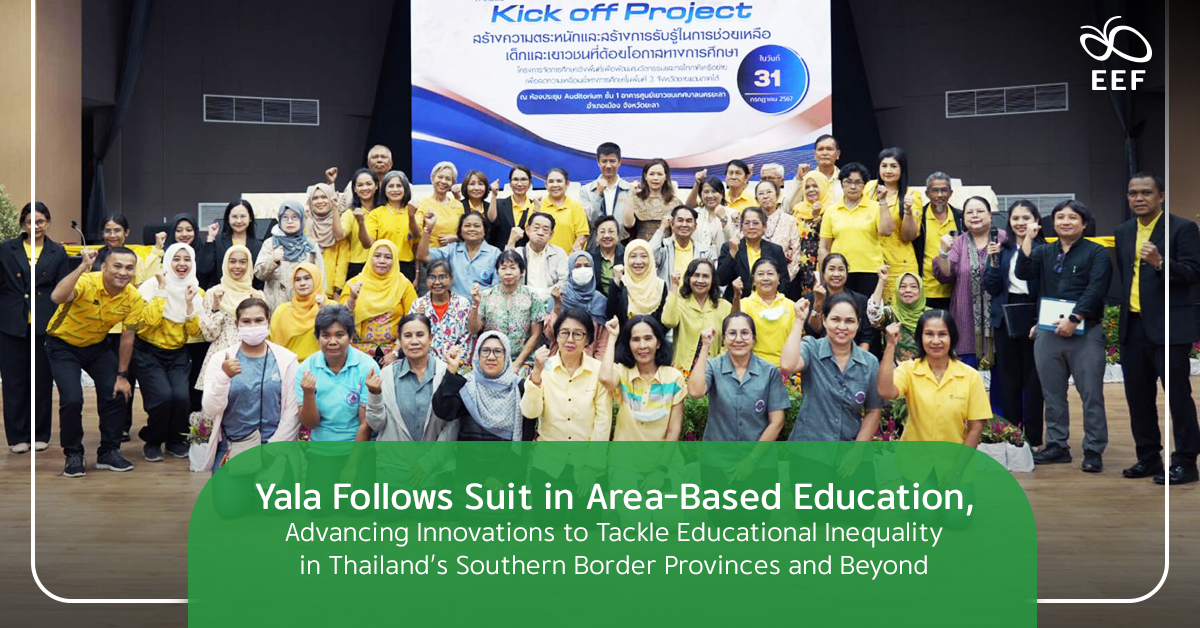
Yala’s localized Area-Based Education (ABE) initiative, integrated into the national overarching ABE network, tackles educational disparities across Thailand’s three southern border provinces by uniting public, private, civil society, and educational sectors, alongside local administrations and communities. Now entering its second phase — with a renewed focus on four districts with nine sub-districts, this initiative was marked with the “Kick-Off” event.
The event aimed to raise public awareness about reducing educational disparities and enhancing educational access for disadvantaged children and youth. It also featured the signing of a Memorandum of Understanding (MOU) among significant local authorities and provincial offices focused on education, vocational training, and public health. The MOU focuses on driving localized partnership mechanisms, educational innovations, and community engagement frameworks to address the current needs of at-risk children and youth in Yala.
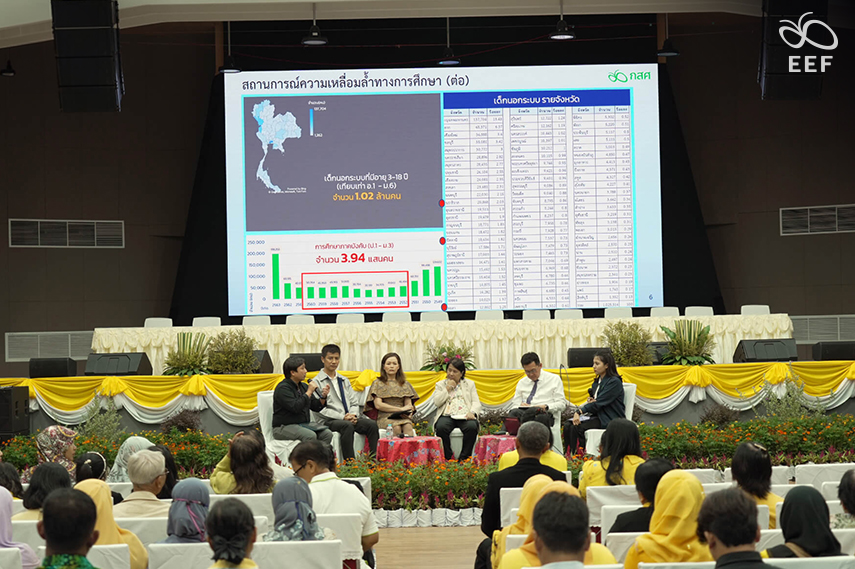
Yala’s per capita income of 68,000 Thai Baht, ranking 70th nationally, highlights the pressing need for substantial local economic development. Despite a strong commitment to youth development, there remains a noticeable disconnect between educational outcomes and industry requirements, signaling an urgent need for a strategic realignment. To bridge this gap, it is essential to forge robust partnerships with a diverse range of local stakeholders, including government bodies, private enterprises, and educational institutions. Collaborative efforts should focus on optimizing resource allocation, refining learning models, and enhancing educational processes. By ensuring that educational outcomes are closely aligned with the evolving demands of the job market, Yala can better equip its youth with the skills and competencies needed for both personal and professional success.
This alignment is not just a matter of economic necessity but a catalyst for broader regional growth, encompassing the three southern border provinces of Yala, Pattani, and Narathiwat, and by extension, the entire country. Addressing the skills gap will not only enhance individual career prospects but also drive economic advancement across these provinces, ultimately fostering a more vibrant and prosperous community. Harmonizing education with industry needs will lay a solid foundation for Yala’s future, creating a model that can spur sustained economic development and social progress throughout the southern border region and beyond.
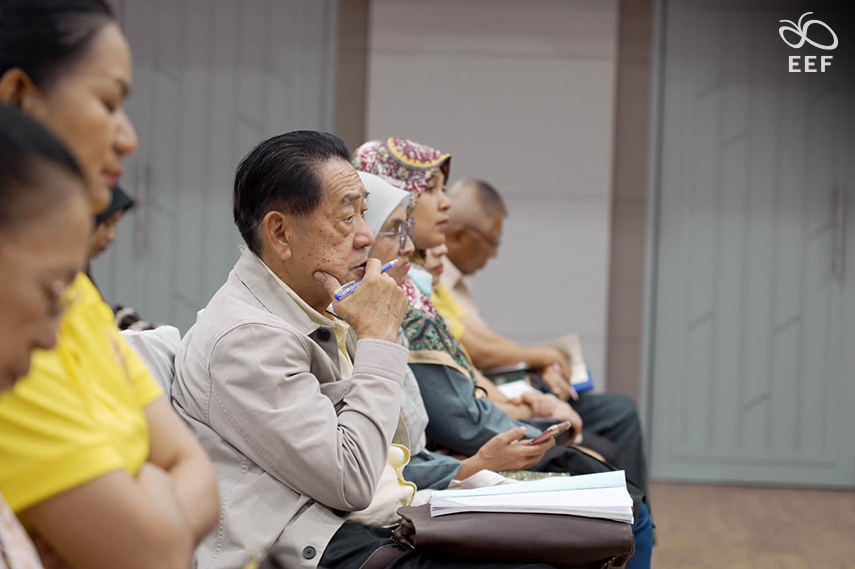
In its second phase, Yala’s localized ABE initiative leverages existing local networks and their expertise in child and youth support, with a heightened focus on deepening learning processes and sustainable development. Now, the initiative targets four pilot districts with nine sub-districts — Mueang (including Yala City Municipality, Sateng Nork Municipality, and the sub-districts of Yupo, Kota Baru, and Lampaya), Raman (Kalupang sub-district), Kabang (Kabang sub-district), and Yaha (Yaha and Ba-ngoi Sinae sub-districts). It aims to enhance area-based education through local mechanisms and innovations, with Yala PAO working in concert with academic experts and multidisciplinary teams to provide coaching and facilitate connections. This approach will strengthen sub-districts, creating models for effective problem-solving and aligning with the government’s national “Thailand Zero Dropout” initiative.
During the MOU signing ceremony, the strategic expansion of Yala’s localized ABE initiative into Pattani — one of the 12 pioneering ABE provinces — and Narathiwat was clearly outlined, with Yala PAO designated as the central management and coordination hub. This expansion aims to cultivate a collaborative environment, fostering the exchange of ideas and approaches across public, private, civil society, and educational sectors, while actively engaging local communities. The efforts aim to achieve two key objectives: First, at the provincial level, they seek to enhance the capacity of each province and its network mechanisms to independently understand, access, and address the educational needs of disadvantaged children and youth. Second, at the regional level, the efforts focus on developing partnership mechanisms and educational innovations specifically designed to meet the needs of at-risk children and youth, including those who have dropped out, across the three southern border provinces.
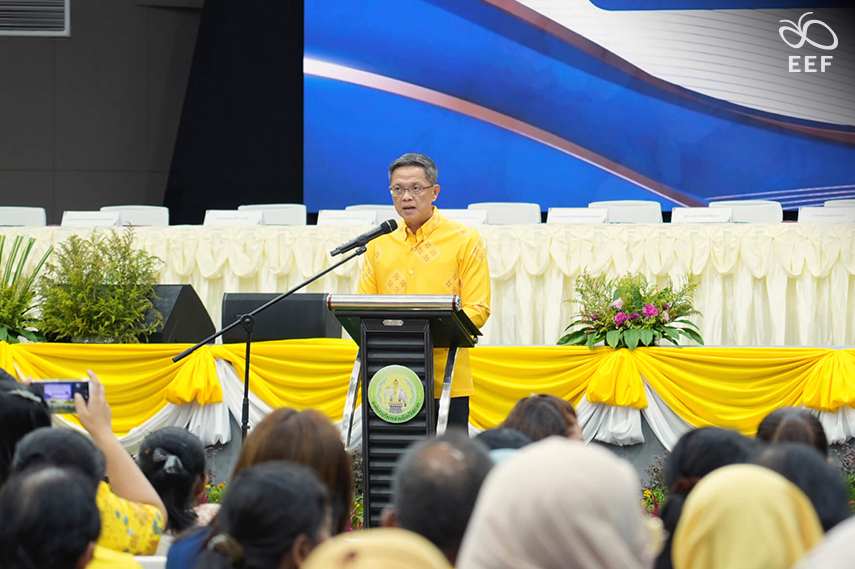
Additionally, the Kick-Off event featured a scholarly forum titled “Directions for Area-Based Education to Drive Partnership Mechanisms and Educational Innovations to Reduce Educational Disparities in Thailand’s Three Southern Border Provinces.” This forum, with insights from key figures such as the Assistant Managing Director of the Equitable Education Fund (EEF) Thailand, the Mayor of Yala City, the Deputy Permanent Secretary of Yala PAO, and professors from Yala Rajabhat University, served as a platform for exchanging ideas and strategies. The discussions aimed to explore how Yala’s ABE model could not only serve as a prototype for Pattani and Narathiwat but also inspire nationwide efforts to reduce educational disparities and enhance opportunities for children and youth across Thailand.
Likewise, Pattani — with its Pattani Unique Area Model — harmonizes educational management efforts across the three southern border provinces of Pattani, Yala, and Narathiwat, integrating cultural assets into educational initiatives to pool expertises and resources effectively. This collaborative approach brings together diverse stakeholders from public, private, civil society, and educational sectors, aiming to elevate educational quality and address dropout rates through extensive interagency cooperation. By developing a comprehensive data system accessible by all relevant agencies, the Pattani Unique Area Model establishes a foundation for tailored interventions, while creating conducive learning environments that align resources with community beliefs. Not only does this strategy improve educational access and community engagement, but it also enhances overall quality of life, social cohesion, and sustainable socio-economic development. Ultimately, this model addresses current educational challenges, fosters skilled and empowered communities, promotes inclusivity, and drives growth towards a prosperous future.
Both Yala’s and Pattani’s localized ABE initiatives aim to tailor educational strategies to their specific regional needs, building on local expertises and community strengths. Yala’s initiative leverages local networks and academic partnerships, providing coaching and facilitates connections to strengthen the nine sub-districts, all in alignment with the “Thailand Zero Dropout” initiative. Similarly, Pattani’s counterpart adapts educational practices to its unique cultural and regional context, fostering collaboration among public, private, and civil society sectors. Both initiatives work to develop localized educational models and effective, context-sensitive solutions that address the needs of at-risk children and youth, including those who have dropped out. This localized approach ensures that each area can address its specific educational challenges and drive meaningful improvements in educational access and quality.
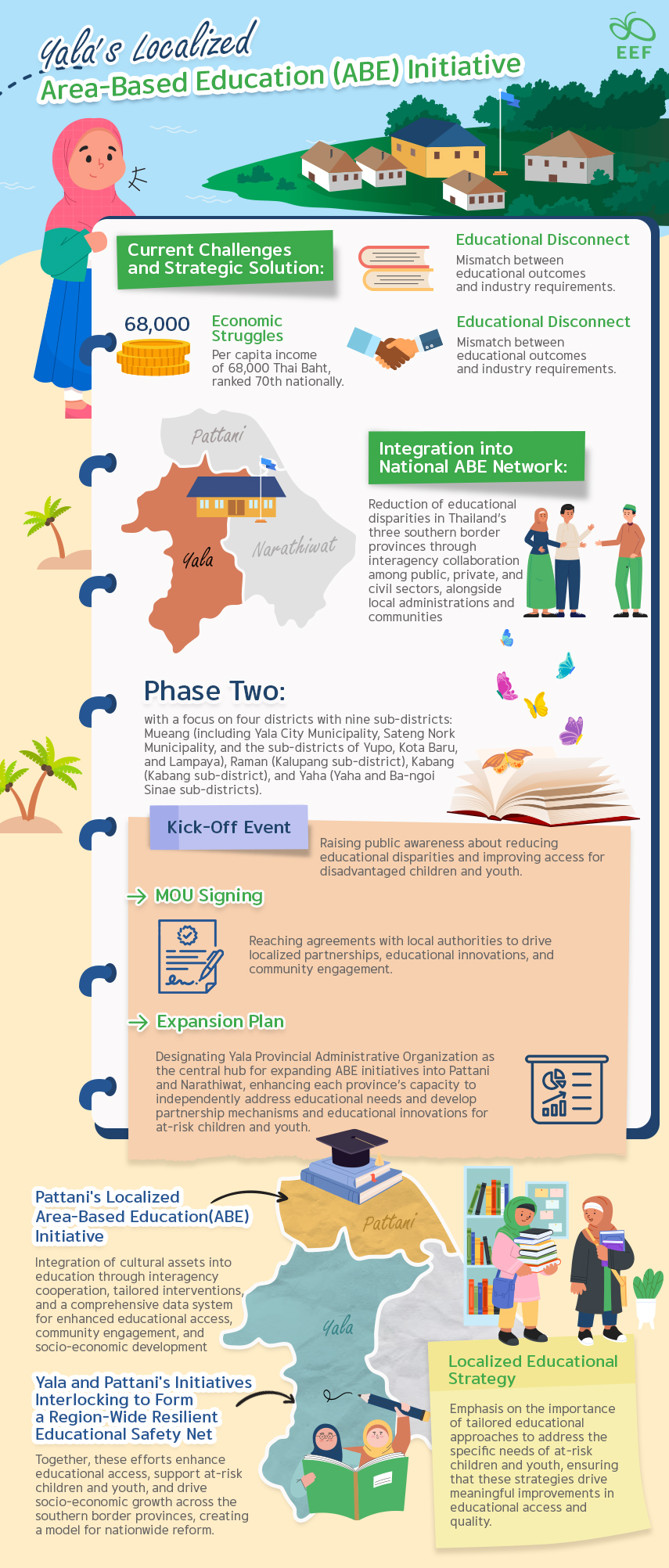
Yala’s Localized Area-Based Education (ABE) Initiative
Current Challenges and Strategic Solution:
- Economic Struggles — Per capita income of 68,000 Thai Baht, ranked 70th nationally.
- Educational Disconnect — Mismatch between educational outcomes and industry requirements.
- Strategic Partnerships — Aligning education with job market demands through collaborative efforts to optimize resources and drive regional growth.
Integration into National ABE Network:
Reduction of educational disparities in Thailand’s three southern border provinces through interagency collaboration among public, private, and civil sectors, alongside local administrations and communities
Phase Two:
with a focus on four districts with nine sub-districts: Mueang (including Yala City Municipality, Sateng Nork Municipality, and the sub-districts of Yupo, Kota Baru, and Lampaya), Raman (Kalupang sub-district), Kabang (Kabang sub-district), and Yaha (Yaha and Ba-ngoi Sinae sub-districts)
- Kick-Off Event — Raising public awareness about reducing educational disparities and improving access for disadvantaged children and youth.
- MOU Signing — Reaching agreements with local authorities to drive localized partnerships, educational innovations, and community engagement.
- Expansion Plan — Designating Yala Provincial Administrative Organization as the central hub for expanding ABE initiatives into Pattani and Narathiwat, enhancing each province’s capacity to independently address educational needs and develop partnership mechanisms and educational innovations for at-risk children and youth.
Pattani’s Localized Area-Based Education (ABE) Initiative
Integration of cultural assets into education through interagency cooperation, tailored interventions, and a comprehensive data system for enhanced educational access, community engagement, and socio-economic development
Yala and Pattani’s Initiatives Interlocking
to Form a Region-Wide Resilient Educational Safety Net
Together, these efforts enhance educational access, support at-risk children and youth, and drive socio-economic growth across the southern border provinces, creating a model for nationwide reform.
Localized Educational Strategy
Emphasis on the importance of tailored educational approaches to address the specific needs of at-risk children and youth, ensuring that these strategies drive meaningful improvements in educational access and quality.
In 2022, Thailand embarked on a groundbreaking initiative to address educational disparities through a network of Area-Based Education (ABE) mechanisms, supported by the Equitable Education Fund (EEF) Thailand. This ambitious project spans 12 provinces, including Mae Hong Son, Sukhothai, Phayao, Lampang, Phitsanulok, Samut Songkhram, Rayong, Khon Kaen, Surin, Surat Thani, Songkhla, and Pattani. The primary goal of this initiative is to tackle educational inequities by decentralizing educational power and promoting innovative, locally-driven solutions. By implementing diverse strategies at both local and provincial levels, the initiative emphasizes the need for tailored approaches and active community engagement. This approach not only aims to enhance educational access and quality but also lays a robust foundation for future expansions, showcasing the effectiveness of localized methods in driving substantial improvements and empowering communities.
The success of the nationwide overarching ABE network is a testament to its transformative approach to bridging educational gaps. Central to its strategy is the detailed identification of target groups and the integration of localized data, enabling swift and precise support that goes beyond mere temporary relief — it is this flexibility to adapt strategies to specific local contexts and needs that ensure the optimal use of resources. The ABE framework operates through iterative cycles, aligning closely with the EEF’s policy dimensions: equalizing educational opportunities, contextualizing education to local realities, diversifying educational options, and fostering collaborative efforts among stakeholders. By prioritizing local autonomy and continuous refinement, the ABE initiative addresses immediate educational challenges while driving systemic changes. This approach contributes to broader policy advancements and local transformations, moving towards a future characterized by decentralized educational management and a significant reduction in educational inequality.
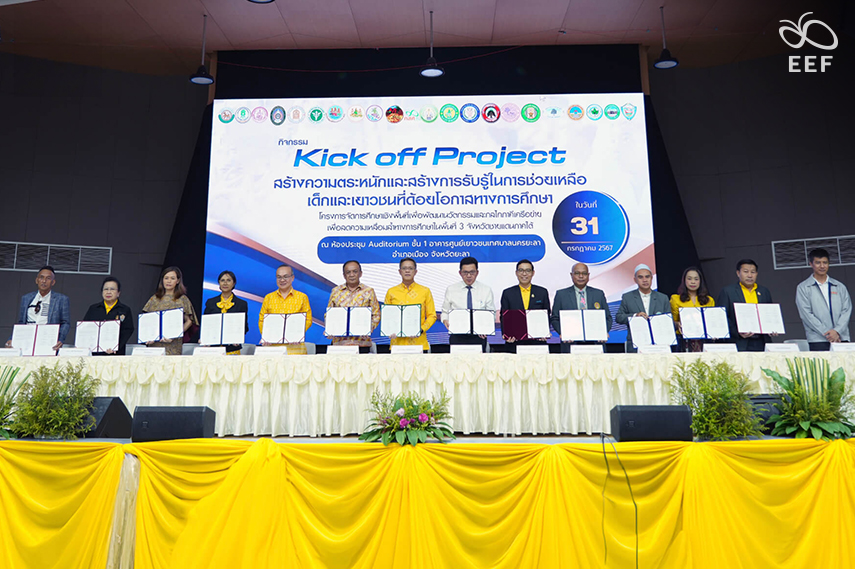
Yala’s joining with the network of 12 pioneering and other emerging Area-Based Education (ABE) provinces underscores its pivotal role in advancing educational equity across Thailand’s southern border provinces and beyond. By aligning with this broader ABE framework, Yala not only follows in the footsteps of the innovative provinces but also amplifies the collective effort to address educational disparities through localized solutions. This collaborative engagement with a diverse range of provinces enhances the impact of Yala’s initiatives, ensuring that its advancements in educational access and quality are part of a larger, cohesive strategy. The synergy between Yala’s localized innovations and the wider ABE network exemplifies how local and regional efforts can drive systemic change, offering a replicable model for tackling educational inequality. As Yala leads by example within this dynamic network, its approach serves as a beacon for other areas, demonstrating the potential for integrated, context-specific strategies to foster a more inclusive and equitable educational landscape throughout Thailand and beyond.
Yala Provincial Administrative Organization (PAO) and the Equitable Education Fund (EEF) Thailand launched the “Kick-Off Project” event to raise public awareness and enhance educational access for disadvantaged youth. This initiative targets early childhood, teen mothers, and at-risk youth, including those outside the educational system in Thailand’s three southern border provinces — Yala, Pattani, and Narathiwat. It seeks to develop innovative area-based mechanisms and foster multi-sectoral partnerships, joining Yala with 12 pioneering and other emerging Area-Based Education (ABE) provinces. By dismantling educational disparities into manageable local units and enhancing collaboration in data, knowledge, and resource management within the province and beyond, Yala’s localized ABE initiative aims to reintegrate underprivileged and marginalized children and youth into the educational system and ensure they receive essential state welfare, making education accessible to all, especially the most vulnerable.

